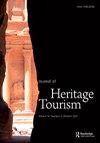The solo pilgrim phenomenon on the Journey to Santiago de Compostela in Spain
IF 2.2
Q2 HOSPITALITY, LEISURE, SPORT & TOURISM
引用次数: 1
Abstract
ABSTRACT This paper focuses on the advantages of pilgrimage for modern-day people, trying to find and describe phenomena that are integral to the pilgrim experience. The aim is to investigate this experience holistically, without any a priori focus on a specific phenomenon. The qualitatively-oriented research was based on semi-structured interviews conducted with seven Czech pilgrims, after their experience from a pilgrimage to Santiago de Compostela in Spain. The textual analyses were performed using the grounded theory method. The main finding is that the most significant benefit of pilgrimage is Intense Self-knowledge as a product of six phenomena: Disengagement from Everydayness, Solitude, Company on the Pilgrimage, Spirituality, Pain and Walking in the Camino Environment. Understanding this phenomenon helps us, in return, to understand the need of post-modern individuals for seeking this unique mode of travel, in which they are jolted out of their routine over an extended period of time and are exposed to an environment associated with a Christian tradition which is based on the archetypal need to wander to find sacredness.西班牙圣地亚哥德孔波斯特拉之旅中的孤独朝圣者现象
本文关注的是朝觐对现代人的好处,试图发现和描述朝觐经历中不可或缺的现象。目的是全面地调查这种经验,而不是先验地关注某一特定现象。这项以定性为导向的研究是基于对七名捷克朝圣者进行的半结构化访谈,他们在西班牙圣地亚哥德孔波斯特拉朝圣后经历了这一过程。本文采用扎根理论方法进行了文本分析。主要发现是朝圣最显著的好处是强烈的自我认识,这是六种现象的产物:从日常生活中解脱出来,孤独,朝圣中的陪伴,灵性,痛苦和在卡米诺环境中行走。理解这一现象有助于我们反过来理解后现代个人对寻求这种独特旅行模式的需求,在这种模式中,他们在一段时间内从日常生活中惊醒,暴露在与基督教传统相关的环境中,这种环境基于对漫游寻找神圣的原型需求。
本文章由计算机程序翻译,如有差异,请以英文原文为准。
求助全文
约1分钟内获得全文
求助全文
来源期刊

Journal of Heritage Tourism
HOSPITALITY, LEISURE, SPORT & TOURISM-
CiteScore
6.50
自引率
11.10%
发文量
39
期刊介绍:
The Journal of Heritage Tourism ( JHT ) is a peer-reviewed, international transdisciplinary journal. JHT focuses on exploring the many facets of one of the most notable and widespread types of tourism. Heritage tourism is among the very oldest forms of travel. Activities such as visits to sites of historical importance, including built environments and urban areas, rural and agricultural landscapes, natural regions, locations where historic events occurred and places where interesting and significant living cultures dominate are all forms of heritage tourism. As such, this form of tourism dominates the industry in many parts of the world and involves millions of people. During the past 20 years, the study of tourism has become highly fragmented and specialised into various theme areas, or concentrations. Within this context, heritage tourism is one of the most commonly investigated forms of tourism, and hundreds of scholars and industry workers are involved in researching its dynamics and concepts. This academic attention has resulted in the publication of hundreds of refereed articles in various scholarly media, yet, until now there has been no journal devoted specifically to heritage tourism; Journal of Heritage Tourism was launched to fill this gap. JHT seeks to critically examine all aspects of heritage tourism. Some of the topics to be explored within the context of heritage tourism will include colonial heritage, commodification, interpretation, urban renewal, religious tourism, genealogy, patriotism, nostalgia, folklore, power, funding, contested heritage, historic sites, identity, industrial heritage, marketing, conservation, ethnicity, education and indigenous heritage.
 求助内容:
求助内容: 应助结果提醒方式:
应助结果提醒方式:


